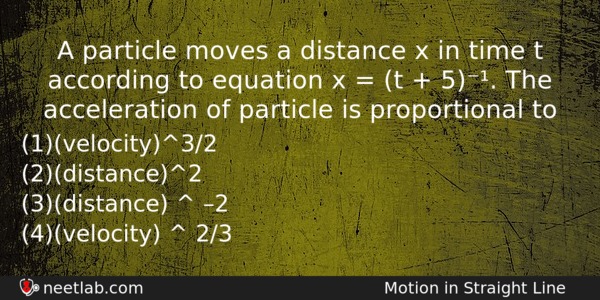| ⇦ | 
| ⇨ |
A particle moves a distance x in time t according to equation x = (t + 5)⁻¹. The acceleration of particle is proportional to
Options
(a) (velocity)^3/2
(b) (distance)^2
(c) (distance) ^ –2
(d) (velocity) ^ 2/3
Correct Answer:
(velocity)^3/2
Explanation:
x = 1 / t + 5
v = dx / dt = -1 / (t + 5)²
a = d²x / dt² = 2 / (t + 5)³ = 2x³
Now, 1 / (t + 5) ∞ v½
1 / (t + 5)³ ∞ v³/² ∞ a
Related Questions: - In a transistor the collector current is always less than the emitter current
- The drift velocity of the electrons in a copper wire of length 2 m under
- If in a nuclear fusion process, the masses of the fusing nuclei be m₁ and m₂
- When a ball is thrown up vertically with velocity vₒ,it reaches a maximum height
- Which of the following is true for elastic potential energy density?
Topics: Motion in Straight Line
(93)
Subject: Physics
(2479)
Important MCQs Based on Medical Entrance Examinations To Improve Your NEET Score
- In a transistor the collector current is always less than the emitter current
- The drift velocity of the electrons in a copper wire of length 2 m under
- If in a nuclear fusion process, the masses of the fusing nuclei be m₁ and m₂
- When a ball is thrown up vertically with velocity vₒ,it reaches a maximum height
- Which of the following is true for elastic potential energy density?
Topics: Motion in Straight Line (93)
Subject: Physics (2479)
Important MCQs Based on Medical Entrance Examinations To Improve Your NEET Score
18000+ students are using NEETLab to improve their score. What about you?
Solve Previous Year MCQs, Mock Tests, Topicwise Practice Tests, Identify Weak Topics, Formula Flash cards and much more is available in NEETLab Android App to improve your NEET score.
Share this page with your friends

Thankyou